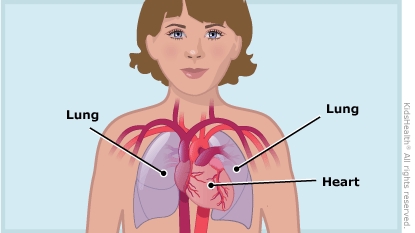Chest Pain: How to Care for Your Child
Many kids and teens get chest pain, but it usually is not caused by a serious illness. Chest pain can happen with asthma, pneumonia, reflux, or muscle strain. Sometimes, it's not clear what's causing chest pain. The cardiologist did some testing and did not find a serious cause for your child's chest pain. You can now care for your child at home.


-
If your child has pain, use these medicines exactly as directed:
-
acetaminophen (such as Tylenol® or a store brand)
-
OR
-
ibuprofen (such as Advil®, Motrin®, or a store brand). Don't give to babies under 6 months old.
-
Do not give aspirin to your child or teen as it has been linked to a rare but serious illness called Reye syndrome.
-
When your child has pain, try:
-
encouraging them to take deep breaths
-
gently massaging the painful area
-
putting a warm compress on the chest
-
If the chest pain seems related to a pulled muscle, your child may need to avoid the activity or sport that caused it for several weeks.
-
Let your child rest as needed.
-
Your child can go to school and do regular activities. Check with the cardiologist if you are unsure whether an activity is safe for your child.

Your child:
-
has chest pain when exercising
-
has a fast heartbeat with the chest pain
-
feels dizzy or weak
-
has chest pain and a fever

Your child:
-
has trouble breathing. Signs you might see include fast breathing, the muscles pulling in between the ribs, or the nose puffing out with each breath.
-
has a fast heartbeat that you can see or feel by checking the pulse rate (any heartbeat less than 150 beats in 1 minute is usually normal)
-
faints when having chest pain

What types of tests do health care providers do for chest pain? Often, health care providers order an electrocardiogram (ECG or EKG) to check how the heart is beating. In some cases, an echocardiogram (ultrasound of the heart) is helpful. This test uses sound waves to create pictures that show how well the heart and its parts are working. The cardiologist will decide if this is needed based on your child's medical history and an exam.
Can chest pain be caused by stress? Yes, sometimes chest pain can happen when a person is stressed. Kids, especially teens, may worry that their chest pain is a heart attack. Reassure your child that the discomfort is not a heart attack and is not life-threatening. If stress might be causing the chest pain, teach your child ways to deal with stress. This can include deep breathing, yoga, and doing relaxing, enjoyable activities.